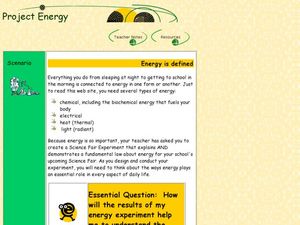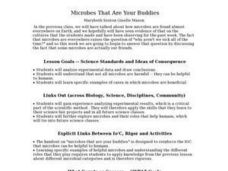Curated OER
Project Energy
Students explore multiple types of energy. In this energy lesson, students prepare a science fair project through completing a WebQuest. Students investigate radiant, thermal, and biochemical energy.
Worchester Polytechnic Institute
Interactive Laboratory Activities for Secondary Education
Do you think the lab smells like rotten eggs? Sorry to hear about your sulfering. A set of five experiments covers many different topics including seasons, gravity, food, precipitation, and photosynthesis. Though not presented as a...
Curated OER
Microbes That Are Your Buddies - Biology Teaching Thesis
Students analyze experimental data and draw conclusions. They are able to comprehend that not all microbes are harmful--they can be helpful to humans. Students are able to comprehend specific examples of cases in which microbes are...
National Wildlife Federation
It's a Green Revolution: An Introduction to Eco-Schools USA
Eco-schools is a project of the National Wildlife Federation and empowers schools to manage their schools with a green focus. Scholars work to define environment and sustainability and springboard this into learning the eight pathways...
Curated OER
Graphing in an Experimental Context
Seventh graders discuss the importance of being able to represent scientific data in the form of graphs. They comprehend the differences between a bar graph and a line graph. Students identify the type of data with which each graph...
Curated OER
Fossil Fuels (Part II), The Geology of Oil: Topographic Mapping, Crustal Deformation, Rock Porosity, and Environmental Pollution
Learners review an interpretation of geologic history and relate it to the formation of oil deposits. They explore and explain factors controlling the porosity and permeability of sediments and sedimentary rocks. Pupils also interpret...







